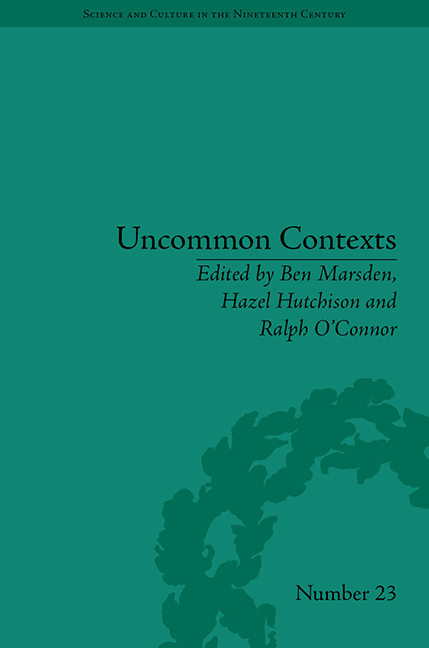Book contents
- Frontmatter
- Contents
- Acknowledgements
- List of Contributors
- List of Figures
- Introduction
- I Literary Genres of Science Writing
- 1 The Experimental Novel and the Literature of Physiology
- 2 An Active Nature: Robert Hunt and the Genres of Science Writing
- 3 Hyena-Hunting and Byron-Bashing in the Old North: William Buckland, Geological Verse and the Radical Threat
- II Pushing the Boundaries of ‘Literature and Science’
- Part III Science and Technology in Fiction
- Notes
- Index
2 - An Active Nature: Robert Hunt and the Genres of Science Writing
from I - Literary Genres of Science Writing
- Frontmatter
- Contents
- Acknowledgements
- List of Contributors
- List of Figures
- Introduction
- I Literary Genres of Science Writing
- 1 The Experimental Novel and the Literature of Physiology
- 2 An Active Nature: Robert Hunt and the Genres of Science Writing
- 3 Hyena-Hunting and Byron-Bashing in the Old North: William Buckland, Geological Verse and the Radical Threat
- II Pushing the Boundaries of ‘Literature and Science’
- Part III Science and Technology in Fiction
- Notes
- Index
Summary
The author combines a highly poetical imagination with a devoted aptitude for the practical pursuits of science. We have seldom seen these qualities in an individual more thoroughly united, and more strongly developed.
In 1829, a slim volume of poetry appeared on the shelves of a small Penzance bookseller's, printed by local subscription and named after a nearby natural land-mark: The Mount's Bay. The book's opening pages ‘appealed’ to its ‘courteous reader’, its author claiming:
The winds carry unawakened music over the most sterile desert, and happy is the wanderer, who can catch but a single strain from the wild poetry of Nature. In my desultory rambles I have felt the influence of that soul inspiring harmony, and longed to impart to others a kindred enthusiasm
The desultory rambler, and author of the text, was Robert Hunt (1807–87): a twenty-two-year-old aspiring poet, who would later be remembered as a chemist, folklorist, geologist, writer, critic and photographer, a ‘self-elevated’ and multifaceted ‘man of talent’. In this chapter I shall argue that the words quoted above, some of the very first Hunt addressed to the world, encapsulated sentiments that would resound throughout his later life, work and writings. An appeal to the active forces of nature, and the nature of the activities in which Hunt hoped his reader to engage, would undergird his numerous writings on the sciences and reconcile his diverse employments and interests.
- Type
- Chapter
- Information
- Uncommon ContextsEncounters between Science and Literature, 1800–1914, pp. 39 - 54Publisher: Pickering & ChattoFirst published in: 2014

